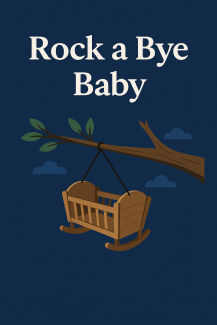
Rock a Bye Baby
Our periodic communication that reminds you to ask, “Should I react to those headlines?”
October 2025
Rock a Bye Baby
Don’t be lulled to sleep by promises of a bright future.
“A farmer has to be an optimist, or he wouldn’t still be a farmer."
― Howard Marks
Currently we find the headlines humming their lullabies. “AI stocks soar again,” “Tech Titans Carry the Market,” “Seven Companies Worth More than Entire Countries,” “Prices at all-time highs on indices.”
The comforting song of investment gains can lull speculators, gamblers, and even the most vigilant of investors into a false sense of security. Believing themselves safe, they let down their guards and doze.
They’ve forgotten how the nursery rhyme ends.
Beneath the soothing tunes of the lullaby, a branch is weakening.
These “all-time high” indices are becoming more concentrated around a few stocks that are priced for a perfect, high-expectation future. The top 10 stocks comprise nearly 40% of the S&P500. In fact, the magnificent seven—Apple, Microsoft, NVIDIA, Amazon, Alphabet, Meta, Tesla—account for about a third of the entire index.
This concentration is not limited to the S&P500. Nasdaq shows signs of even more concentration and “closet index funds,” along with investment managers all over the world jumping on the bandwagon to “keep up with the index.”
This concentration of gains isn’t a sign of health and strength. Instead, we view it as a sign of fragility.
Easy as it is to succumb to complacency amidst supposed victory, we have the advantage of the cycles that came before. Cautionary tales of the slumbering investors who came before.
- The nifty fifty period of the 1960s and ’70s ended in a bear market of ’73 to ’74 and lasted until 1982, when some of those companies lost 60 to 80% of their value within two years. While some of those companies were fantastic investments, they weren’t cycle-defying.
- 1980s Japan: At its peak in 1989, Japan was 45% of the world equity market cap. Today, it’s less than 6%.
- 2000 Dot-com Bubble: Cisco, Intel, Microsoft, and GE were giants of that cycle. Nasdaq fell 78%. As we know, Microsoft survived and thrived, but it too cycled.
As you know, we confess to being horrible market timers, and have as one of our investor mindset reminders that we have no skill in predicting market moves, economic cycles, political events, etc.
What we do know is that historically investors have been better whenever they remember the cycles. Growing prosperity does not mean uninterrupted gains. Eventually, the bough will break, and the proverbial cradle will fall.
Thanks for your attention. I hope this helps, and please be safe,
James
IMPORTANT DISCLOSURE INFORMATION
Please remember that past performance may not be indicative of future results. Different types of investments involve varying degrees of risk, and there can be no assurance that the future performance of any specific investment, investment strategy, or product (including the investments and/or investment strategies recommended or undertaken by Advisor.Investments [“AI”]), or any non-investment related content, made reference to directly or indirectly in this blog will be profitable, equal any corresponding indicated historical performance level(s), be suitable for your portfolio or individual situation, or prove successful. Due to various factors, including changing market conditions and/or applicable laws, the content may no longer be reflective of current opinions or positions. Moreover, you should not assume that any discussion or information contained in this blog serves as the receipt of, or as a substitute for, personalized investment advice from AI. Please remember that if you are a AI client, it remains your responsibility to advise AI, in writing, if there are any changes in your personal/financial situation or investment objectives for the purpose of reviewing/evaluating/revising our previous recommendations and/or services, or if you would like to impose, add, or to modify any reasonable restrictions to our investment advisory services. To the extent that a reader has any questions regarding the applicability of any specific issue discussed above to his/her individual situation, he/she is encouraged to consult with the professional advisor of his/her choosing. AI is neither a law firm nor a certified public accounting firm and no portion of the blog content should be construed as legal or accounting advice. A copy of the AI’s current written disclosure Brochure discussing our advisory services and fees is available for review upon request. Please Note: AI does not make any representations or warranties as to the accuracy, timeliness, suitability, completeness, or relevance of any information prepared by any unaffiliated third party, whether linked to AI’s web site or blog or incorporated herein, and takes no responsibility for any such content. All such information is provided solely for convenience purposes only and all users thereof should be guided accordingly.

